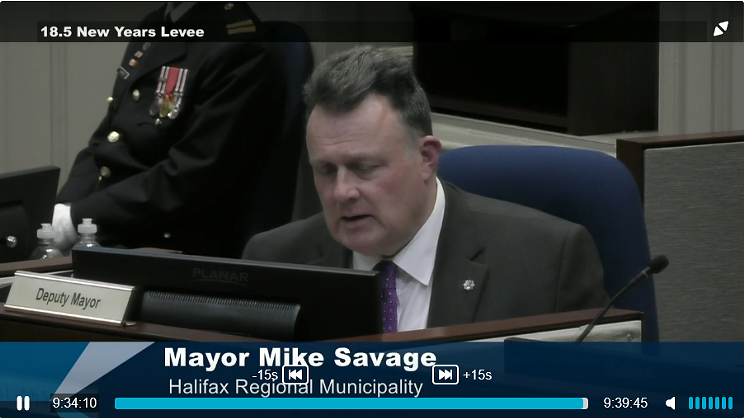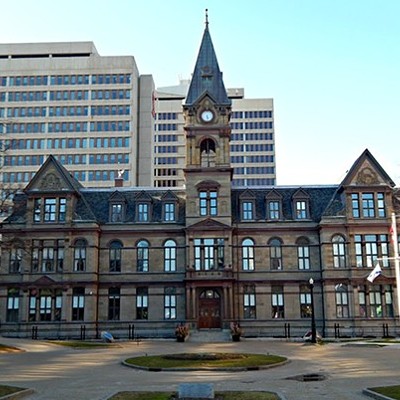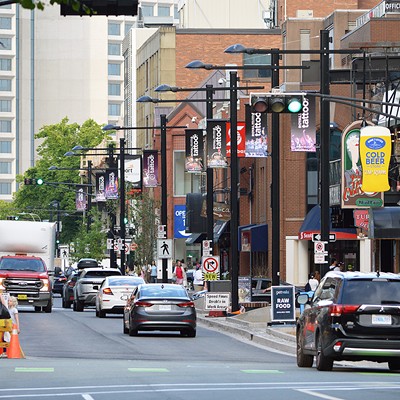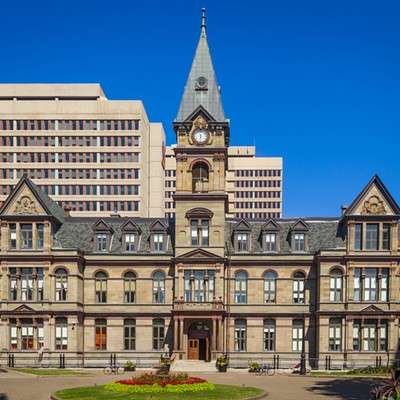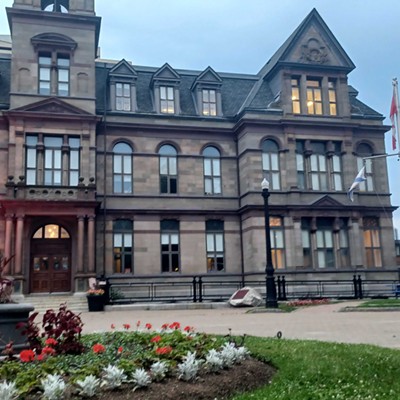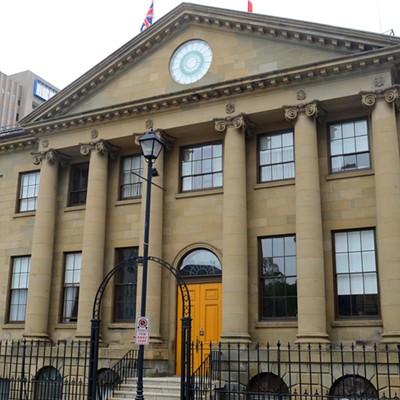A little bit of classism was the only real low light in a massive meeting at the end of a massive year in municipal politics. So without further ado, let’s get into it.
Things that passed:
The budget committee met as a part of this meeting, but that got it’s own story which can be found here:
At the council meeting proper, Mike Savage added a motion to cancel the New Year's Day levee, and instead donate that money to a local charity. The money to pay for the levee comes from the mayor’s fund, and is his to do what he wants with. But he needed council’s approval to give the money to the North End Community Centre. Councillor David Hendsbee channelled his inner Marie-Antoinette and asked if they could still have the New Year’s Day party and let the residents of Grand Parade feast on the leftover scraps.
A levee is an embankment built to prevent the overflow of a river, or a party originally designed so men could fawn over a king. Levees back in the day allowed people to participate in the monarch’s morning routine on the first day of the new year. This tradition has continued, and has expanded. Now instead of just men rubbing elbows with the king, the HRM opens up the doors to City Hall and allows everyone to rub elbows with the mayor. Most HRM community centers also have a January 1st levee, and these are not cancelled, so if you want to see what one is all about, head on over to your local rec centre.
Councillor Lindell Smith asked that this information report on the HRM’s living wage policy be brought to council. The reason he brought this forward is slightly unclear. The HRM is considering a living wage policy, and Smith asked staff if they were considering the concerns of higher-paid HRM employees. Their fear is that they won’t get a pay bump in line with the lower-paid employees, as they are being brought up to a living wage. Their “concern” here is that higher-paid, more-specialized employee salaries may not look as good by comparison to the working stiffs, and may impact the city’s ability to hire those specialized employees. Staff have taken this concern on board, and we’ll see if it influences the living wage policy update council is expecting.
Halifax Public Libraries is asking for more money to buy more books, mainly ebooks, ahead of budget season. Every year the libraries ask for more money for ebooks because the city has historically seen ebooks as a “service enhancement” and not part of the library’s core job. Also, Jeff Bezos has a monopoly on ebooks so libraries everywhere are getting gouged by the Amazon billionaire. This passed on the consent agenda, and will influence the shape of the library’s budget when it comes back for approval in a few months.
Last year council voted to increase arts funding, and this meeting they voted to make it more reliable with three-year grants instead of one-year ones. City staff assured councillors that new applicants could get municipal funding as there would be a rotating intake. It wouldn’t be one set of grants for three years, every three years. This passed with that clarification.
The city is leaving money on the table by not updating or having a policy to automatically update fees associated with tax sales. Council has modernized tax sale fees to start picking up that money from the table.
The city of Halifax is continuing the trend of significant symbolic victories that will require significant follow-up policies to become a reality. Halifax is pledging to become a biodiverse city. When will that happen for realsies? Soon™, as staff assured council this work will be folded into ongoing departmental work and could be easily incorporated into day-to-day operations.
HRM is thinking about getting rid of a bunch of surplus land for a slew of reasons. The current plan for a lot of these properties is affordable housing. Councillor Lovelace, who apparently hasn't looked at home prices since 2010, raised concerns about a patch of surplus land in her district. She said that since the homes surrounding the surplus lot were valued at $500,000 the surplus land wasn’t a good fit for affordable housing. On top of that, she argued, that land was not a good fit for the sale because of bad muncipal planning, saying that it had no transit service. So she put forward a motion to get the property in her district removed from the surplus land list.
To recap: Lovelace, who is now the chair of the transportation standing committee, tried to deny an opportunity for affordable housing, in a housing crisis due to the deficiencies of municipal transit planning. Transit planning is something that can be fixed by the committee she now chairs.
After Lovelace’s motion was voted to a tie (eight councillors voting for it: Savage, Hendsbee, Kent, Purdy, Mancini, Lovelace, Blackburn and Outhit, vs 8 against: Deagle Gammon, Austin, Mason, Smith, Cleary, Morse, Cuttell and Stoddard, with Paul Russell absent), and a tie meaning a defeated motion, Lovelace and Cleary could he heard bickering at each other on hot mics.
Lovelace started redeeming herself after the brutal start to this debate when she waded back in, wanting to know what the plan would be to replace the bike lane (read paved shoulder), on one portion of this surplus land if it becomes private. CAO Cathie O'Toole reassured Lovelace that even though this land was being declared private today, in a few years (read up to a decade) city staff would start planning how to replace the bike lane (read paved shoulder) lost today. Except for 42 and 46 Chamberlain Drive in Westphal, all of the lands identified by staff were declared surplus.
The property on Chamberlain will get a staff report because David Hensdbee swears the city is supposed to offer land to abutting property owners before selling them. He says it’s in the charter; city lawyers told him it was not. So now there will be a staff report which will likely explain in further detail why Hensdbee’s memory is incorrect.
Ground search and rescue operations, which before this meeting encompassed a ragtag collection of non-profit organizations, is now recognized as an organization providing a public good in the HRM, and should get consistent funding. This process was started because one of the volunteer SAR orgs didn’t get their paperwork in on time to apply for funding. This in turn led councillors to ask why SAR organizations needed to apply for funding, because one would assume such a vital emergency public good the city relied on wouldn’t be completely volunteer-led, would it? Since it was, these changes came down the pipe. Also passed at this meeting was a motion for property tax relief for volunteer emergency service providers.
Council wants to put affordable housing by the new Cogswell Exchange. They started that planning process on Tuesday.
City council is considering changing how they make developers build infrastructure. The city currently uses letters of credit, but Clayton Developments has asked the city to consider development bonds. Perhaps too simplistically: Developers would buy bonds from the city that are the cost of the infrastructure associated with the development. Once the infrastructure is built, the developer can cash out their bond, and get the money back. In exchange, the city gets infrastructure. This change could be extremely beneficial to the city, because it could price the bonds at whatever would be required for sustainable infrastructure. For example, if this bond structure was in place for the development of Indigo Shores, then the city would either have had all the required infrastructure, like dry hydrants, or a bond with enough money to cover the gap. The only problem with this proposed change is that staff is not recommending following a fulsome public consultation on this, instead saying talking to developers and a pro-forma public hearing to tick the box is enough. Hopefully council says we should have more of an opportunity to weigh in on this change; this likely deserves an email to your local councillor asking for that.
The regional plan review feedback came back to council today, and this report is a beast. Most of the feedback about the plan from the public and internally from staff is that the proposed legislative amendments could be stronger, better and faster. City staffer Leah Perrin gave an update on that, councillors weighed in, and staff are hoping to have the legislative version of the plan written and ready in spring 2024. There will be at least one more public engagement session before this becomes law of the land, but early indications are that this report, depending on timing, could be huge for the city. (More in the Notable Debates section below.) But this was accepted by council and the actual legislation should be better, stronger and faster.
Council is going to allow concrete to be poured until 9:30pm with the proper permits, starting by giving this bylaw a first reading on Tuesday when it passed on the consent agenda.
CSAP is having elections, and that’s something the HRM helps with (because it has to thanks to the Municipal Elections Act). This also passed on consent.
Halifax is going to have new campaign finance rules that make it somewhat less advantageous to be rich. This also passed.
Halifax is looking to outsource safe school drop offs in the hopes a private consultant can come up with a plan to keep kids safe from parental drivers in time for the city to spend money on it in next year’s budget. Hendsbee told staff to also consider that high school students leave school at lunch, and usually have to walk on rural highways to go to local restaurants. Right now they have to do that dangerously for the same reason school drop is unsafe: Bad infrastructure and transportation options that are not protected from the danger of drivers. We’ll see what this report comes back with.
Halifax Transit will get a safety program Soon™.
HRM’s high school students will hopefully get to ride the bus for free starting next year. Councillors will likely direct the CAO to come up with a plan to fund it, then all they have to do is vote for it at budget time. Along with all the other things we need. While councillors try to keep our taxes low. For political reasons, not fiscal ones. This passed on consent.
The corner of Robie and Spring Garden Road is going to look wildly different in about 10 years time if council approves this block redevelopment. They started that process, but this will come back for a public hearing and second reading. This public hearing will also be likely quite well attended by Friends of the Halifax Common, who have been quite vocal in their opposition to this tower, going so far as to commission a study in their attempts to block this development.
The Dartmouth Post Office will be allowed to be substantially altered after Tuesday’s meeting. Some of these alterations are substantial because the building was built at a time when we didn’t really care about accessibility. This passed on consent.
New deputy mayor Cathy Deagle Gammon is going to ask the CAO to write a policy that caps councillor pay increases with that of “the Average Industrial Weekly Earnings for all industries excluding unclassified businesses for Canada as reported by Statistics Canada for the same period and shall not exceed 4%.” This is required to ensure councillors don’t get pay raises above and beyond the folks they represent.
Deagle Gammon asked to see if access-a-bus services can be expanded in areas with park-n-rides. This’ll get a report.
Councillor Shawn Cleary wants to know if short-term rental operators can pay the marketing levy quarterly or semi-annually instead of monthly. This will get a report.
Cleary also wants to know if the city can make it illegal to point lights at other people’s houses. This too will get a report.
On top of the levee fund redirect, councillors added a few other items to the agenda. Tony Mancini brought his extended producer responsibility legislation to council, and it got approved. Patty Cuttell seems to have been swayed by rural arguments, and asked her councillors to increase funding to rural transit grants which haven’t gone up in a while. Her peers agreed to get a staff report. And finally councillor Cuttell also asked for, and got, a staff report on de-registering York Redoubt as a heritage property.
And there were a half-dozen in-camera items for good measure.
Notable Debates:
The regional plan review came back to council after a summer of gathering public feedback, and staff have made some changes. One of the things they heard loud and clear was that transportation planning was not as holistic as it should be, if the city is serious about meeting its goals as outlined in things like the Green Network Plan and the Intergrated Mobility plan. In fact, one of the main criticisms of past municipal planning exercises is that they lack the legal framework to be considered by staff in the tangible, functional, day-to-day planning processes that run this city, like development agreements. Even though the HRM charter says large plans are supposed to come with the required bylaws. The Green Network plan, as part of this regional plan review, will now have legislative teeth to be considered in development agreements.
And these changes will have far-reaching, but subtle, influences on how the city achieves its strategic goals, as this bylaw package will change how the city is governed on a day-to-day basis. And there’s a lot of reasons to be optimistic for the future, especially if this regional plan review is combined with councillor Outhit’s motion from last budget meeting, directing staff to come back to council with a budget in line with the city’s stated priorities. Especially when you consider the city has a new CAO who—unlike the old guy—seems to know her way around achieving a strategic plan.
So while there are reasons for optimism, it’s also painfully clear that all of this could be undone by councillors who seem to think we can eat cake if we run out of bread.

